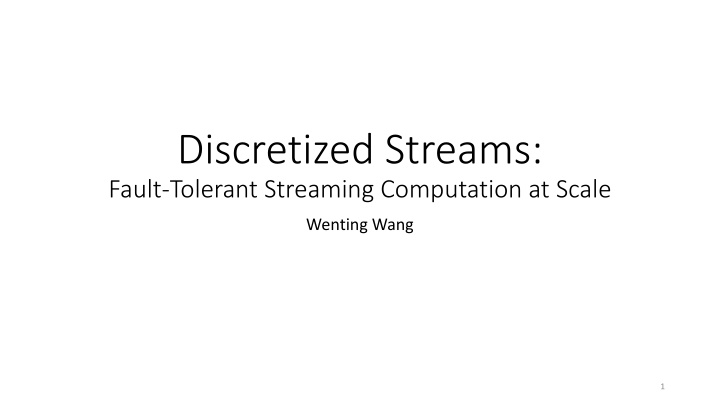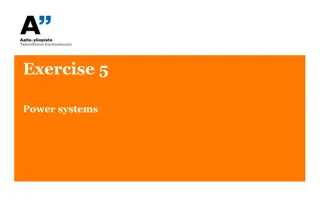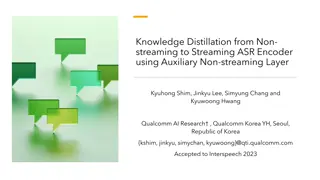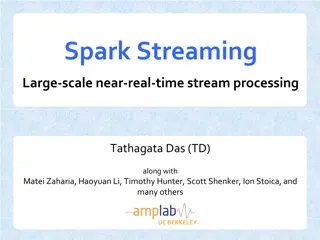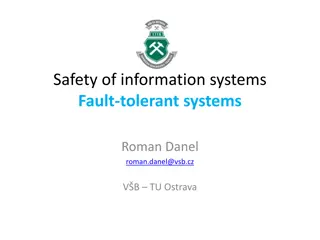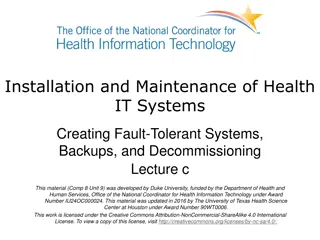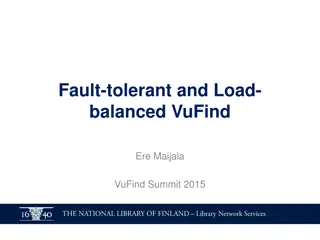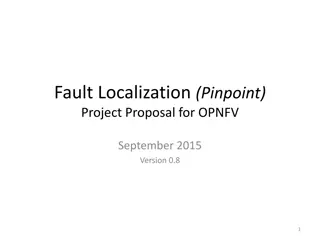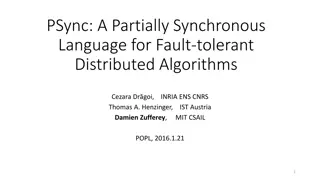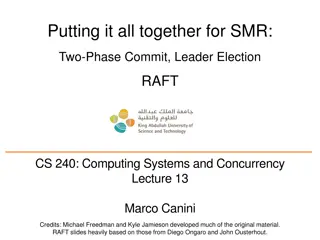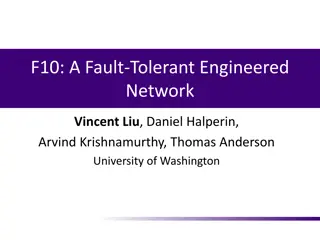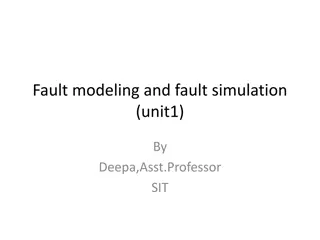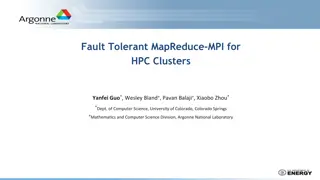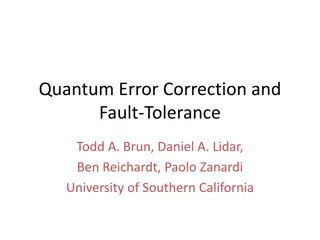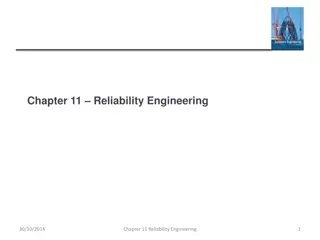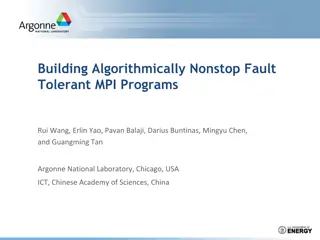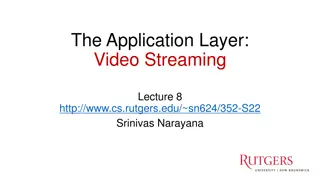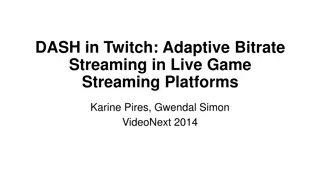Discretized Streams: Fault-Tolerant Streaming Computation
Many important applications require processing large data streams in real time with second-scale latency, scalability to hundreds of nodes, and fault tolerance. Discretized Streams offers a solution by treating streaming computation as a series of small batch jobs stored in memory as Spark RDDs. RDDs are immutable, in-memory, partitioned collections that maintain lineage information for fault recovery without full replication. This approach allows for fast recovery from faults and stragglers while keeping state between batches in memory for deterministic, fault-tolerant operations.
Download Presentation

Please find below an Image/Link to download the presentation.
The content on the website is provided AS IS for your information and personal use only. It may not be sold, licensed, or shared on other websites without obtaining consent from the author.If you encounter any issues during the download, it is possible that the publisher has removed the file from their server.
You are allowed to download the files provided on this website for personal or commercial use, subject to the condition that they are used lawfully. All files are the property of their respective owners.
The content on the website is provided AS IS for your information and personal use only. It may not be sold, licensed, or shared on other websites without obtaining consent from the author.
E N D
Presentation Transcript
Discretized Streams: Fault-Tolerant Streaming Computation at Scale Wenting Wang 1
Motivation Many important applications must process large data streams in real time Site activity statistics, cluster monitoring, spam filtering,... Would like to have Second-scale latency Scalability to hundreds of nodes Second-scale recovery from faults and stragglers Cost-efficient Previous Streaming frameworks don t meet these 2 goals together 2
Previous Streaming Systems Record-at-a-time processing model Fault tolerance via replication or upstream backup Replication Upstream Backup No 2x hardware, slow to recovery Fast Recovery, but 2x hardware cost Neither handles stragglers 3
Discretized Streams A streaming computation as a series of very small, deterministic batch jobs immutable dataset (output or state); stored in memory as Spark RDD 4
Resilient Distributed Datasets(RDDs) An RDD is an immutable, in-memory, partitioned logical collection of records RDDs maintain lineage information that can be used to reconstruct lost partitions lines = spark.textFile("hdfs://...") lines errors=lines.filter(_.startsWith( ERROR )) errors HDFS_errors=filter(_.contains( HDFS ))) HDFS errors HDFS_errors=map(_.split( \t )(3)) time fields 5
Fault Recovery All dataset Modeled as RDDs with dependency graph Fault-tolerant without full replication Fault/straggler recovery is done in parallel on other nodes fast recovery 6
Discretized Streams Faults/Stragglers recovery without replication State between batches kept in memory Deterministic operations fault-tolerant Second-scale performance Try to make batch size as small as possible Smaller batch size lower end-to-end latency A rich set of operations Combined with historical datasets Interactive queries live data stream DStream Processing batches of X seconds Spark processed results 7
Programming Interface Dstream: A stream of RDDs Transformations Map, filter, groupBy, reduceBy, sort, join Windowing Incremental aggregation State tracking Output operator Save RDDs to outside systems(screen, external storage ) 8
Windowing Count frequency of words received in last 5 seconds words = createNetworkStream("http://... ) ones = words.map(w => (w, 1)) freqs_5s = ones.reduceByKeyAndWindow(_ + _, Seconds(5), Seconds(1)) DStream Transformation Sliding Window Ops freqs_5s 9
Incremental aggregation Aggregation Function freqs = ones.reduceByKeyAndWindow (_ + _, Seconds(5), Seconds(1)) Invertible aggregation Function freqs = ones.reduceByKeyAndWindow (_ + _, _ - _, Seconds(5), Seconds(1)) 10
State Tracking A series of events state changing sessions = events.track( (key, ev) => 1, // initialize function (key, st, ev) => // update function ev == Exit ? null : 1, "30s") // timeout counts = sessions.count() // a stream of ints 11
Evaluation Throughputs Linear scalability to 100 nodes 12
Evaluation Compared to Storm Storm is 2x slower than Discretized Streams 13
Evaluation Fault Recovery Recovery is fast with at most 1 second delay 14
Evaluation Stragglers recovery Speculative execution improves response time significantly. 15
Comments Batch size Minimum latency is fixed based on batching data Burst workload Dynamic change the batch size? Driver/Master fault Periodically save master data into HDFS, probably need a manual setup Multiple masters, Zookeeper? Memory usage Higher than continuous operators with mutable state It may possible to reduce the memory usage by storing only between RDDs 16
Comments No latency evaluation How does it perform compared to Storm/S4 Compute intervals need synchronization the nodes have their clocks synchronized via NTP 17
